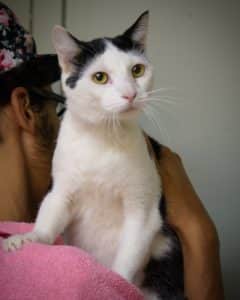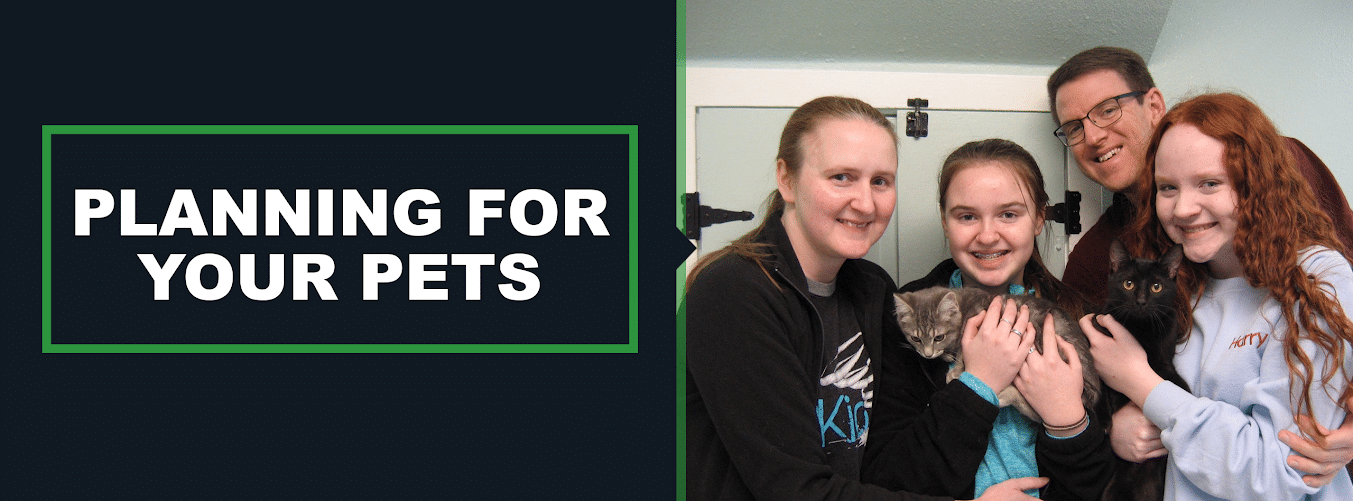Pets – The only property that will miss you when you are gone
By D. Faith Orlowski
Oftentimes it is easy to decide how your property will be distributed after you are gone – but what about your sentient property!? Pets are living, feeling “property”, yet many people do not have a plan in place to be sure that their pets are cared for when something happens to their “master.” As an estate planning attorney, I always ask my clients during the first interview if they have pets and if they have a person that will step up immediately if something happens to them to assure that their pets have a safe home. You would be surprised how many of these clients either say “no” or are at least very hesitant to say that they are certain. Many say their children and other relatives would not be willing to take in their animals once they die.
As you are probably aware, animals are considered personal property in Oklahoma, like a chair or television. But, of course, we all know they have nothing in common with furniture and the thought of a beloved pet being sent to the “pound” upon their owner’s death is abhorrent to many of us. So what is pet guardian to do if they do not have a friend or family member that they are sure will adopt their animals? Or what if the conditions that the friend or family member are experiencing at the time of your death have changed such that they cannot fulfill their promise? In Oklahoma, there are alternatives.
When I ask a client about what will be done with their pet when they die and they shrug and say, “Well, I guess Toto will just have to be put down,” I try not to audibly gasp! People say this not because they are unfeeling but because they do not know that they have alternatives. Following is a brief description of some of the main avenues people can take to assure that their pets are well cared for after they are gone.
 Gifting the animal to caretaker. This is the most common because it tends to be the simplest. While most people just assume that a family member or friend may step up, it is best to spend a few minutes with a professional to lay out an enforceable plan that allows you to describe how and who (and alternative “who’s”) you would like and the information regarding your four-footed or feathered or gilled friends.
Gifting the animal to caretaker. This is the most common because it tends to be the simplest. While most people just assume that a family member or friend may step up, it is best to spend a few minutes with a professional to lay out an enforceable plan that allows you to describe how and who (and alternative “who’s”) you would like and the information regarding your four-footed or feathered or gilled friends.
Examples of Caretaker provisions to use in an estate plan or letter of direction are as follows:
Gift With Funds For Care of Pet With Remainder Funds Going to Caregiver.
“I leave any pets which I may own at the time of my death to _________________ together with the sum of $_________ to be used by him/her for the care and maintenance of such pets. In the event that _________________ has predeceased me, or refuses to take my pets, then I leave them to _________________, together with the sum of $_________ for their care and maintenance. In either event, should there be monies remaining out of the $_________ after the last of any pets die, such balance shall pass outright to the party taking care of said pet or pets. In the event that I own no pets at the time of my death, then this bequest shall lapse and become a part of my residuary estate hereinafter disposed of.”
Gift With Funds to Caregiver With Outright Bequest
“I give my pets that I may own at the time of my death to __________________, with the request that he/she treat them as companion animals. If he/she is unable or unwilling to accept my animals, I give such animals to __________________, with the request that he/she treat them as companion animals. If he/she is unable or unwilling to accept my animals, my Personal Representative shall select an appropriate person to accept the animals and treat them as companion animals, and I give my animals to that person. I direct my Personal Representative to give $__________ from my estate to the person who accepts my animals, and I request that these funds be used for the care of my animals.”
 Adoption: If you do not have someone to be a caretaker, then consider adoption through an animal shelter, rescue organization or veterinarian. The availability of this option often depends on the breed, age, special needs and temperament of the animal (and the number of animals!) Many veterinarians – for a fee – take in animals for adoption but the time to determine this is while you are still alive and able to find such local vets that agree to this arrangement.
Adoption: If you do not have someone to be a caretaker, then consider adoption through an animal shelter, rescue organization or veterinarian. The availability of this option often depends on the breed, age, special needs and temperament of the animal (and the number of animals!) Many veterinarians – for a fee – take in animals for adoption but the time to determine this is while you are still alive and able to find such local vets that agree to this arrangement.
Examples of provisions for this situation are as follows:
Placement by Rescue Group:
“If my [spouse] fails to survive me, I entrust my pets to the care of __________________ to see that they are properly cared for until such time as a suitable, loving home can be found for them. Any expenses that __________________ may incur for caring for my pets before finding them a good home, including the cost of transporting my pets, shall be paid from my residuary estate as an administration expense.”
Placement by Animal Shelter:
“I give all of my pets to [Animal Shelter], presently located at [address], with the following requests:that [Animal Shelter] take possession of and care for all my animals and search for good homes for them; that until homes are found for any animals, the animals be placed in foster homes rather than in cages at the shelter, if possible; that if it is necessary to keep some of the animals in cages while making arrangements to find permanent homes, in no event should any animal stay more than a total of 2 weeks in a cage; that each animal should receive appropriate veterinary care, as needed; that after attempts have been made for three (3) months to place an animal, __________________ be contacted if it is not possible to place an animal so that he/she can assist with finding a home for the animal; that the shelter make every effort to assure that none of my animals are ever used for medical research or product testing or painful experimentation under any circumstances; and that, after placement, shelter personnel make follow-up visits to assure that may animals are receiving proper care in their new homes.
“If [Animal Shelter] is in existence at the time of my death and is able to accept my animals, I give $__________ to [Animal Shelter]. If [Animal Shelter] is no longer in existence or is unable to accept my animals, I give my animals and $__________ to one or more charitable organizations as my Personal Representative shall select, subject to the requests made above and with the condition that each are a no-kill shelter or organization.
 Animal Trust. Yes, Oklahoma allows you to establish a Trust now or in your estate planning documents to support and care for your animals. This is a good option when there is larger number of pets (but this certainly can be done for only one animal) or where there is a sufficient amount of money. If this is one of your primary desires – the future care of your animals – you should investigate the Pet Trust. Now you cannot name the animal(s) as the direct named beneficiaries of the Trust – this causes the trust to be void. But just like you were establishing a trust for minor children, you can set up the trust with a caretaker/guardian/trustee and instruct the trustee how and when to distribute the funds for the care of your pets.
Animal Trust. Yes, Oklahoma allows you to establish a Trust now or in your estate planning documents to support and care for your animals. This is a good option when there is larger number of pets (but this certainly can be done for only one animal) or where there is a sufficient amount of money. If this is one of your primary desires – the future care of your animals – you should investigate the Pet Trust. Now you cannot name the animal(s) as the direct named beneficiaries of the Trust – this causes the trust to be void. But just like you were establishing a trust for minor children, you can set up the trust with a caretaker/guardian/trustee and instruct the trustee how and when to distribute the funds for the care of your pets.
The hard questions are:
- How much money to fund the trust?
- What happens to the money when the animals die? (This can create a conflict of interest if the caretaker gets the money that is left once the pets die).
- How explicit do you get with the instructions of how to care for the animals?
- Do you want to leave instructions for the final disposition of the pet upon its death? (Pet Cemeteries and Crematories are in most major cities. Tulsa has more than one.)
- Should the trustee be given the power to name a new caregiver if the primary and successor caregivers named in the trust fail?
Just as with trusts for human beneficiaries, trusts for animals can be established during the pet owner’s life or by Will after the pet owner dies. The benefit of having the trust established during your life and in place is that you become disabled or must move into a care facility that does not allow pets, everything that is needed for your pets to be cared for is already in place. You can even appoint a person or entity to be a trust advisor or otherwise have “standing” to question how the trust is being administered or how the pets are being cared for.
 Pet “Retirement” Home. For certain people and certain pets, a viable alternative is a pet retirement home. If you have sufficient funds and you want to be certain that there will be someone there to help with your animals (or your animals have special needs), this alternative can give you great peace of mind. This option requires advanced planning and a reservation fee is usually required while you are still alive to assure that they will accept your pet when you are deceased. OSU offers such a program and it is called the Cohn Pet Care Facility. It was built as a permanent home for animals whose owners planned in advance to ensure their beloved pets would be cared for in the owner’s absence. The reservation/endowment paid upfront secures the funds necessary to provide shelter, food and veterinary care for the life of your pet. There are other such facilities around the country and new ones appearing each year. Just be sure to do your homework to verify that the facility is sufficiently funded so that it will still be in business when the need arises.
Pet “Retirement” Home. For certain people and certain pets, a viable alternative is a pet retirement home. If you have sufficient funds and you want to be certain that there will be someone there to help with your animals (or your animals have special needs), this alternative can give you great peace of mind. This option requires advanced planning and a reservation fee is usually required while you are still alive to assure that they will accept your pet when you are deceased. OSU offers such a program and it is called the Cohn Pet Care Facility. It was built as a permanent home for animals whose owners planned in advance to ensure their beloved pets would be cared for in the owner’s absence. The reservation/endowment paid upfront secures the funds necessary to provide shelter, food and veterinary care for the life of your pet. There are other such facilities around the country and new ones appearing each year. Just be sure to do your homework to verify that the facility is sufficiently funded so that it will still be in business when the need arises.
The above options are summaries only and other questions pertaining to each need to be discussed. But if you are one of the millions of people with pets as a member of your family, you should spend some time with an estate planning professional to discuss these options. Having some plan in place is better than no plan and it could mean the difference of knowing that your pet will have a new home should something happen to you versus the possibility of an untimely euthanization of a healthy pet.

